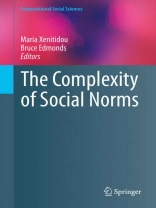This book explores the view that normative behaviour is part of a complex of social mechanisms, processes and narratives that are constantly shifting. From this perspective, norms are not a kind of self-contained social object or fact, but rather an interplay of many things that we label as norms when we ‘take a snapshot’ of them at a particular instant. Further, this book pursues the hypothesis that considering the dynamic aspects of these phenomena sheds new light on them.
The sort of issues that this perspective opens to exploration include:
- Of what is this complex we call a ‘social norm’ composed of?
- How do new social norms emerge and what kind of circumstances might facilitate such an appearance?
- How context-specific are the norms and patterns of normative behaviour that arise?
- How do the cognitive and the social aspects of norms interact over time?
- How do expectations, beliefs and individual rationality interact with social norm complexes to effect behaviour?
- How does our social embeddedness relate to social constraint upon behaviour?
- How might the socio-cognitive complexes that we call norms be usefully researched?
Daftar Isi
The Conundrum of Social Norms.- Part I: The Complex Roots of Social Norms.- Misperception is Reality: The “Reign of Error” about Peer Risk Behaviour Norms among Youth and Young Adults.- Norms and Beliefs: How Change Occurs.- Social norms from the perspective of embodied cognition.- It Takes Two to Tango: We-Intentionality and the Dynamics of Social Norms.- The Relational Foundation Of Norm Enforcement.- Part II: Methods and Epistemological Implications of Social Norm Complexity.- Norm Emergence in Regulatory Compliance.- Norm Dynamics Within the Mind.- Vulnerability of Social Norms to Incomplete Information.- Part III: Evaluating Complex Approaches to Norms.- The “Reign of Mystery”: Have We Missed Something Crucial in Our Experimental and Computational Work on Social Norms?.- Three Barriers to Understanding Norms: levels, dynamics and context.
Tentang Penulis
Maria Xenitidou is a Research Fellow of the Centre for Research in Social Simulation (CRESS) at the University of Surrey. Her main interests are in identity issues, the study of social regularities and contingencies, and in research methods – mainly in qualitative methods, also focusing on methods’ epistemological assumptions and claims.
Bruce Edmonds is the Director of the Centre for Policy Modelling (CPM) and Senior Research Fellow in the Business School at the Manchester Metropolitan University. His interests are in all aspects of social simulation, including methodology, philosophy and applications. He has just published a handbook on “Simulating Social Complexity” with Springer.












